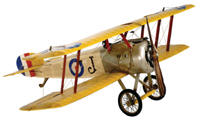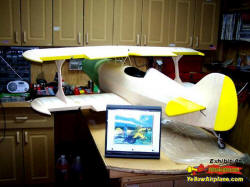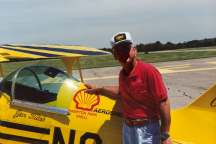 |
|
|
Sopwith Aircraft Models, Sopwith Camel, Sopwith Pup and the Triplane, World War 1 Fighter Model Airplanes.

Sopwith Camel World War 1 Model Airplanes.
of the WW1 Prop Fighter Model Department.
in the YellowAirplane store.
Sopwith Camel Model Airplanes; One of the most well know planes of World War 1 was the Sopwith Camel, a new type of World War 1 weapon is here today for your airplane model collection. Includes the Sopwith Pup and Triplane Aircraft Models.
Uno de los aviones ms bien conocido de la Primera Guerra Mundial 1 fue el Sopwith Camel, un nuevo tipo de la Primera Guerra Mundial un arma est aqu hoy para su coleccin de modelo de avin. Incluye los modelos de avin Sopwith Pup y triplano.
| The Sopwith Camel was perhaps the best Allied fighter of WWI, successfully downing 1,924 aircraft in only 16 months of fighting. It was known for being extremely agile and for having a fast rate of climb, and perhaps most notably, the great Baron von Richthofen fell to the guns of a 209 Squadron RAF Camel flown by Canadian Roy Brown in 1918. The aviation art section has some great World War 1 photos and other images. Building and owning these aircraft will give anyone a good picture of world war 1 history. Sopwith also was famous for the Sopwith Pup and the British Sopwith Triplane. These Sopwith model airplanes come in 1/20, 1/24, 1/32, 1/48 and 1/72 Scale Pre Built Diecast and Mahogany Display Models and Balsa Wood and Plastic Model Kits. |
| Jet Fighters | WWII Fighters | WWI Fighters | Guitars | Ships | Spacecraft | Tanks |
|
|
Sopwith Camel WW1 Model Airplanes! |
|
|
|
|
|
A List of All Model Airplane Decal Manufacturers A List of All Model Kits by Scale A List of All Model Airplane Manufacturers
|
|
|
Everything about the Sopwith Camel Airplane
Everything about the Sopwith Tabloid Airplane
Everything about the Sopwith Schneider Airplane |
|
|
Lebed VII Russian copy of the Sopwith Tabloid Scout." src="images/Sopwith_Tabloid_Scout_Lebed_VII_Russian_Copy_Airplane.jpg" border="0" hspace="10" vspace="4" width="278" height="181" align="left">The Lebed VII Airplane Sopwith
Camel F.1 Sopwith Camel flown by Capt. Roy Brown when he chased Baron Manfred von Richthofen over the Somme on April 21, 1918 - the flight from which the famous "Red Baron" did not return. Perhaps the single most famous Allied fighter of World War I, this is the Sopwith Camel flown by Capt. Roy Brown when he chased Manfred von Richthofen (the "Red Baron") over the Somme in 1918 - the flight from which von Richthofen did not return. 9-cylinder rotary engine; two Vickers machine guns with the prototypical fairing hump that gave the Camel its name; 209 Squadron, RAF markings;
Clerget Engine Models and Information Clerget engines were made in 110 hp and 130 hp models, however, the 130 hp may have been a little overdeveloped, since it was subject to overheating Sopwith Schneider 1/48 Kit" src="images/Sopwith_Schneider_Floatplane_Version_Sopwith_Tabloid_Scout.jpg" border="0" vspace="4" hspace="10" width="271" height="173" align="left"> Sopwith Schneider, the floatplane version of the Sopwith Tabloid scout aircraft introduced in 1914.
Sopwith Camel the most successful Camel in the history of the RAF! Wearing the 1917 markings of Canadian ace William G. Barker, who used it to shoot down more than 40 aircraft and observation balloons, it features two Vickers machine guns. |
|
Sopwith Schneider, the floatplane version of the Sopwith Tabloid scout aircraft introduced in 1914.
World War 1 Sopwith Camel Aviation Art and Gifts
World War 1 Sopwith Camel Books
Sopwith Camel Airplane Shirts, Hats and Clothing |
|
Hi there: I am a WWI aircraft enthusiast and I stumbled upon your web site. You have some good things here. Just a comment about the spiel on the Sop Camel. The number of enemy aircraft doesn't seem consistent with other figures I have read i.e. The Aerodrome. Also, while the airplane/pilots were responsible for the largest number of enemy aircraft downed, it killed over 360 of it's own pilots in accidents/mishaps. So, from the evidence, perhaps it would be reasonable to measure " the best fighter" from a number of perspectives. Regards, Richard |
Look Below for More Biplane Pictures and Exhibits
|
World War 1 Sopwith Camel Aviation Art and Gifts World War 1 Sopwith Camel Books
Click Here for Model Builder Supply Needs.
Sopwith Camel WW1 Aviation Art.
Typhoon Mosquito Spitfire British Fighter Jets British WWI Aircraft British Airways
|
Jack Varanelli's Pitts Radio Controlled Kit Built to look exactly like Chuck Robert's Pitts Airplane, here's a whole construction exhibit on how a foam airplane, covered with balsa wood is built. This is a 1/3rd Scale Radio Controlled Model with a 2-1/2 HP motor. A real nice exhibit Exhibit Added 20 Jan. 2008 |
 |
|
The
First Certificated Pitts |
 |
World War 1 Sopwith Camel Aviation Art and Gifts World War 1 Sopwith Camel Books
|
Aircraft
: Sopwith Camel MANUFACTURER : Sopwith Aviation Co. Ltd. Year : 1917 Engine : 1 x "Bently"BR.1 150 hrs. pwr. / One 130 Clerget 9 cylinder rotary Wingspan : 8.50 m 28ft Length : 5.60 m Weight : 470 kg/695 kg 1,453 lbs Max. speed : 199 km/h 115mph Ceiling : 5650 m 19,000 ft Crew : 1 Armament : 2 x machineguns |
|
Sopwith Camel WWI Historical Research Notes:
Sir Thomas Sopwith The Camel was perhaps the best Allied fighter of WWI, successfully downing 1,924 aircraft in only 16 months of fighting. It was known for being extremely agile and for having a fast rate of climb, and perhaps most notably, the great Baron von Richthofen fell to the guns of a 209 Squadron RAF Camel flown by Canadian Roy Brown in 1918. "Black Maria," the famous Triplane flown by 60-victory ace Lt. Col. Raymond Collishaw (the highest scoring RNAS ace and the second highest scoring Canadian ace) in 1917. The Camel had great agility in combat because of the fantastic torque of its rotary engine and because the engine, pilot and guns were all located in the first seven feet of the wooden airframe. the most successful Camel in the history of the RAF! Wearing the 1917 markings of Canadian ace William G. Barker, who used it to shoot down more than 40 aircraft and observation balloons. unlicensed Russian copy of the Sopwith Tabloid scout biplane Sopwith Schneider, the floatplane version of the Sopwith Tabloid scout aircraft introduced in 1914 Camel flown by Royal Flying Corps 54-victory ace Maj. Donald MacLaren. Sopwith Camel - Britain's biplane fighter that shot down more than 1,200 enemy aircraft during World War I. Perhaps the single most famous Allied fighter of World War I, this is the Sopwith Camel flown by Capt. Roy Brown when he chased Manfred von Richthofen (the "Red Baron") over the Somme in 1918 - the flight from which von Richthofen did not return. the famous Sopwith Camel F.1 flown by 27-victory ace Lt. Clifford MacKay "Black Mike" McEwen (who went on to become an Air Vice-Marshall in the Royal Canadian Air Force) of No. 28 Squadron, Royal Flying Corps, when he recorded four of his final six victories in the skies over Italy. No.10 Squadron was formed in February 1917 as part of the rapid naval aviation expansion program on the Western Front. Sopwith Camel F.1 - This model wears the 1917 markings of Canadian ace W.G. Barker, who used it to shoot down more than 40 aircraft and observation balloons, making it the most successful Camel in the history of the RAF. Fokker Dr.I - This triplane, flown by 17-victory ace Leutnant Rudolf Klimke of Jasta 27, includes the anchor that Klimke painted on his aircraft (for good luck) at the insistence of his mother an unlicensed Russian copy of the Sopwith Tabloid scout biplane Captain Elliot Springs, 16-victory WWI ace and one of the most colorful American flyers of the war, leads the 148th Aero Squadron. British and Empire Aces of World War I, Shores. While the Allies and their adversaries raced to outdo each other in the creation of genuinely effective fighters in WWI, it was not until 1917 that the British developed a truly effective interrupter gear, paving the way for the Sopwith Camel, S.E.5 and Bristol F.2B. The 17th Aero Squadron in World War I. Reed & Roland. The 17th Aero Squadron flew Sopwith Camels under British command along the Western Front during the summer of 1918. The last of the famous Sopwith fighters to enter service during WWI, the Dolphin and the Snipe built on the strong scouting heritage of the Pup and Camel. The Dolphin, a heavily-armed, negative-staggered-wing biplane, provided the pilot with the best possible tactical view for seeking the enemy. The Snipe succeeded the Camel in August 1918 and proved its superiority over virtually all other fighters. Sopwith Camels, each carrying 250-pound bombs, take to the skies from HMS Furious - the first dedicated aircraft carrier in the world - on a raid against the German Zeppelin sheds at Tondern. Carried out on July 19, 1918, this was the first successful bombing raid ever to be launched from a carrier. The Sopwith Camel is widely recognized as the most successful allied fighter of the Great War. Of the men who flew them exclusively, one name stands out above the rest - Major Donald R. MacLaren, who achieved 54 victories, the final nine of which were scored in this machine. Captain R.A. Little, the RNAS' highest-scoring ace with a total of 47 victories, achieves one of the 15 attained while flying a Sopwith Triplane with No. 8 Squadron RNAS between April and July 1917 The Camel was the most successful fighting scout employed by either side in WWI, responsible for destroying 1,294 enemy aircraft. Requiring highly skilled pilots, many pilots were lost learning to fly the nimble aircraft. The family of Sopwith fighters served England, France and the U.S. throughout World War I, with the 1 Strutter, the Pup, the Camel the Snipe and others becoming classics of the period. Sopwith Pup, the first proper British fighting scout that - though achieving much success after it arrived on the Western front in 1916 - saw its final combat at the end of 1917 when it ceded the skies to the even more famous and successful Sopwith Camel. |
| The Camel was perhaps the best allied fighter of WW I. Its victory tally was 1,924 aircraft shot down in only sixteen months of fighting. The Sopwith Camel was an Aces' mount which was extremely agile and had a fast rate of climb. In a controversial air battle in 1918, the great Baron Von Richthofen fell to the guns of a 209 Squadron RAF Camel flown by Canadian Roy Brown. |
Please Note:
I took the photo of the clouds used in the background picture
while we were
flying from a Northern Siberian city named Khatanga
on our way to
the North Pole in April 2002. C. Jeff Dyrek, webmaster
|
|
|
|
| . |
| . |
第一次世界大戰最眾所周知的飛機之一,是Sopwith駱駝,1武器今天在這裡為您的飛機模型收集了第一次世界大戰的新類型。包括Sopwith小狗和三平面的機型。
विश्व युद्ध के एक सबसे अच्छी तरह से पता विमानों के Sopwith कैमल विश्व युद्ध के एक नए प्रकार है 1 हथियार यहाँ अपने हवाई जहाज मॉडल संग्रह के लिए आज था. Sopwith पिल्ला और Triplane विमान मॉडल शामिल है.
Один из наиболее известных самолетов Второй мировой войны 1 был верблюд Sopwith, новый тип мировой войны 1 оружие здесь сегодня для Вашей коллекции модель самолета. Включает Sopwith Pup и Триплан Модели самолетов.
Ένα από τα πιο καλά γνωρίζετε αεροπλάνα του Β 'Παγκοσμίου Πολέμου 1 ήταν το Camel Sopwith, ένα νέο είδος παγκόσμιου πολέμου 1 όπλο είναι εδώ σήμερα για τη συλλογή μοντέλο αεροπλάνο σας. Περιλαμβάνει την Sopwith κουτάβι και Triplane μοντέλα αεροσκαφών.
كان واحدا من الطائرات اكثر نعلم جيدا من الحرب العالمية 1 Sopwith الجمل، وهو نوع جديد من الحرب العالمية 1 السلاح هنا اليوم لجمع النموذج الخاص بالطائرة. يتضمن نماذج الطائرات والجرو Sopwith Triplane.
Models_World_War_1/Biplane_Sopwith_Camel_Models.html|61892"
4-19-2010 12-29-2010 12-13-2011 9-6-2012 2-15-2014
| . |